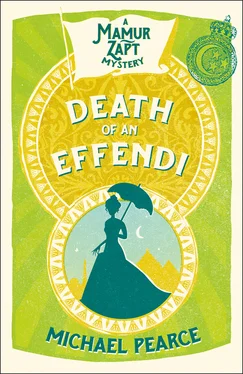They drove for an hour through a countryside which, although Owen had now lived in Egypt for several years was unfamiliar to him. What he knew was city and sand and river. But here were fertile green fields, burgeoning with grapes, figs, apricots, olives, corn and cotton and bursting with roses. Everywhere the fields were crossed by little canals and in the distance was a long turquoise streak which gradually revealed itself to be a lake.
The hotel was a row of roomy square tents along a stone terrace above the lake. Tied up to the bank were boats of all sorts, some rowing, some sailing, some as old as the Pharaohs, woven out of reeds, mere baskets on the water pushed along by paddles.
The vehicles stopped and the guests were shown to their tents by stooping, scarlet-cummerbunded suffragis. Afterwards, a cold lunch was served beneath the palm trees. Wines – not the perfectly respectable wine of the district but from Burgundy and the Loire – accompanied the food and beside each table was a bucket filled with ice and containing a welcoming bottle of champagne.
For this was no ordinary shooting party. When Nuri Pasha, Zeinab’s father, had heard who was to be present, his eyes had widened.
‘My dear boy,’ he had said, ‘you don’t think you could wangle me an invitation?’
But that was something that even the Mamur Zapt, Head of the Khedive’s Secret Police, could not do. Indeed, what he himself was doing there was open to question.
Tvardovsky was sitting at the table next to Owen. He was sitting alone, looking out over the lake, crumbling his bread roll nervously. Sweat was running down his face; where his hand had rested on the tablecloth there was a damp patch. He dabbed at his forehead with his napkin, then wiped round above his collar.
Suddenly, he threw down the napkin, got to his feet and walked down to the water. Owen gave it a moment and then went down to join him.
‘Why do they have to kill?’ demanded Tvardovsky.
‘Kill?’
Tvardovsky gestured towards the ducks nosing peacefully in and out among the reeds.
‘Why don’t they just leave them alone?’
Owen looked back up at the tables, at the pale, fat men in their new tropical suits and with their new sun helmets parked cautiously on the ground beside them, and laughed.
‘Looking at the marksmen,’ he said. ‘I think there’s a fair chance they’ll miss.’
Tvardovsky laughed too, a short, fierce laugh, more like a bark than a laugh.
‘They don’t usually,’ he said.
Some men had joined the group up on the terrace: His Highness himself and some of the princes, the Minister of Finance, the Governor of the Bank of Egypt, the Chairman of the British Chamber of Commerce and the Financial Adviser. His Highness seated himself in a plush red armchair and a man Owen didn’t know but guessed to be the new Russian Consul began to go round the tables bringing up their occupants for presentation to him. Afterwards, they were drawn aside into conversation with the other members of his party. There was no problem about language; all the Russians spoke French, as did, as a matter of course, all the Egyptian upper classes and all the senior officials.
Owen had thought that Tvardovsky might be out of it but when he saw the new arrivals he hurried back up to the terrace and inserted himself beside the Financial Adviser, who was, certainly, in this assembly, the man to talk to.
Owen returned to his table and went on with his lunch. Gradually the tables emptied and there was a general cluster in the middle around His Highness’s party.
After a while, Owen became aware that he was not the only one remaining on the periphery. At the table next to his was a woman in her early thirties, tall, slim, blonde and dressed in jodhpurs, an embroidered blouse and, incongruously, a dark veil.
‘I’ve been wondering about you,’ she said. ‘You’re not one of us and yet you don’t seem to be one of them. Which side are you on?’
‘I’m not on anyone’s side,’ said Owen, ‘who’s anything to do with finance. They won’t have me. Wisely.’
‘Dear, dear!’ said the woman. ‘I have a feeling you won’t get far in life.’
She belonged, presumably, to one of the financiers.
‘So what are you doing here?’ she asked.
‘Oh, I’m just here in a general capacity,’ said Owen, ‘as one of the Khedive’s servants.’
The woman looked at him closely, then laughed.
‘I understand,’ she said. ‘We have them too. People who serve the Tsar. In a general capacity.’
That evening there was a reception for the shooting party. Waiters moved among them carrying silver trays on which were thin-stemmed glasses of sherry, cut-glass tumblers of whisky and some other glasses containing a colourless liquid: vodka, Owen supposed, in deference to the visitors’ tastes.
One of the princes, Fuad, came across to him.
‘Not drinking?’
‘No.’
‘I suppose not.’ He looked across the terrace. ‘How’s Tvardovsky?’
‘All right. So far.’
The prince considered.
‘I think he’s an egg,’ he said.
‘I beg your pardon?’
‘An expensive Fabergé egg; but cracked.’
Owen found it hard to get to sleep that night. Partly it was the mosquito netting rigged up around the bed, which made it very hot. A sensible precaution, no doubt, in view of the proximity to water, but one that Owen, in Cairo, was accustomed to doing without. Partly, though, it was the noise the hyenas were making. He could hear them laughing all along the shore.
He slipped out of his bed and went to the door of the tent. Outside, the moonlight made it as bright as day. In Tvardovsky’s tent, however, next to his, there was a lamp still on. He stepped across and put his ear to the flap. Tvardovsky seemed to be working. He heard the rustle of papers and from time to time a low exclamation, as if the Russian was surprised at what he found.
Owen went back to his tent. Out behind the reeds the moon was silvering the water. A puff of wind ruffled the leaves of the palm trees along the terrace and a moment later broke up the silver into myriads of glittering fragments. Owen thought he heard the plop of a fish.
Over by the kitchen there was a sudden shout and then, clear in the moonlight, Owen saw a hyena loping away, carrying something in its mouth. Whoever had shouted did not bother to chase it and soon, out in the shadows, Owen heard the crack as the creature’s powerful jaws got to work.
And now there was a different noise. From one of the tents further along the row he could hear a woman’s soft moans. Well, that was what she was there for, presumably.
The moans quickened, became urgent and then sighed away, and then for a while all was quiet. Owen wondered whether to go back to bed but knew that if he went back too soon he would stay awake. He thought about going down to the lake. But there was always Tvardovsky.
He heard someone moving among the tents and then, to his surprise, for he had assumed she was otherwise engaged, he saw the blonde woman. She was wearing a long black kimono. Her feet were bare. He stepped back from the doorway. There was a swish of silk as she went past. Outside Tvardovsky’s tent she hesitated and then went in.
There were no moans this time, just what appeared to be a short, intense argument in a language Owen did not understand. Then the woman came out again, so quickly that he had no time to step back. She saw him standing there and smiled.
The next morning, after breakfast, the waiters arranged some armchairs beneath the palms and the financiers continued their discussion. Owen stayed on the terrace at his breakfast table. After a while, one of the waiters, a young, pleasant-looking man, came up to him.
‘You no talking?’ he said in English.
Читать дальше












